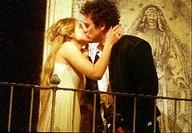Romeo & Juliet Review RSC 2004
This production of Romeo and Juliet is part of a season of Shakespeare's tragedies being staged by the Royal Shakespeare Company at the Albery Theatre. Hamlet was first up in November, and King Lear and Macbeth are slated for January and February respectively.
The plot revolves around two wealthy families, the Capulets and the Montagues, who've been feuding for years. As the play opens, yet another street fight ensues between the two warring factions and Prince Escalus, the ruler of Verona where the play is set, has had enough - any more brawling and 'heads will roll'. It's an ominous warning of what is to come. But Shakespeare, perhaps the supremo of storytellers, has a few surprises up his sleeve for the citizens of Verona (and for us, the audience)- because in this play, it's not human beings who hold the reins, it's fate.
At the beginning of the play Romeo, one of the Montague clan, is all gooey-eyed over a girl who's basically not interested in him. So his mates decide to take him off to a bash that the Capulets are holding to introduce their daughter, Juliet, to a potential husband, Paris. But when Romeo and Juliet set eyes on each other, they both fall instantly in love. The next day, with the help of a local Friar, they secretly get hitched. But their nuptials are marred by another street brawl that leads to the death of Romeo's friend Mercutio, whereupon Romeo takes revenge by killing Tybalt, from the Capulet family. Sticking to his guns, the Prince banishes Romeo on pain of death. So before they've even got into bed together, Romeo and Juliet are to be parted.
Back at the Capulet house, Juliet's father (blissfully ignorant of his offspring's marital status) is busy arranging the marriage of his daughter to Paris. In desperation, Juliet turns to Friar Laurence again who hatches a plan to get her out of the forthcoming wedding, and to bring her and Romeo together again. And at that point you'll have to fend for yourself, because to tell you what happens next will spoil the story if you've never seen it before. And, if you're one of the many millions who've studied the play for GCSE or A level or some other tortuous exam, you'll know what happens anyway. All I will tell you is that it's not a happy ending - well, it is a tragedy!
Of course, not everyone has seen Shakespeare's plays before, and I've often wondered what a 'novice' would make of them. As an experiment, I took along a friend who's never seen Shakespeare performed in live theatre, nor read this play. Nevertheless, it got a big 'thumbs-up' from my guest whose eyes were well and truly opened in appreciation of both the play (as well as the playing). Perhaps this isn't quite so surprising. After all, Shakespeare was a master of his craft - a great storyteller with a unique command of the language to match. And the RSC has crafted a captivating production that can be appreciated both by first-timers and seasoned devotees alike. And it was encouraging to be in a packed house with a wide range of ages represented.
This production certainly doesn't drag its' feet. Deftly executed scene changes and polished performances all-round keep the audience wholly engaged and focused. It's fast moving without being hurried - you won't be glancing at your watch, even though the play is almost 3 hours long.
If you like your Shakespeare in 'tights' then this production will suit you well. I have to confess that I prefer a traditional approach to Shakespeare's plays - I'm not convinced by transferring them to LA, Nazi Germany, the outback of Australia, Antarctica or wherever.
Simon Daw's simply designed, but highly effective set defines a tired city that has seen better days, perhaps reflecting the weariness caused by feuding. More importantly, the simplicity of the set allows the audience to focus on the excellent performances that neither my guest nor I could fault.
Sîan Brooke is not only a beautiful and strong-willed Juliet, but also displays a great sense of humour and not a little lust! I thought her playing of the balcony scene innovative and refreshing. But she was admirably supported by Matthew Rhys as Romeo, who makes the transition from love-sick boy to heart-broken husband convincing and believable. I also liked Gideon Turner's swaggeringly confident Mercutio, and June Watson gave an exceptional performance as the Nurse - funny, bawdy, maternalistic, seemingly dotty but with the cunning to tease (if not torment) Juliet about Romeo's marital intentions.
Peter Gill (Director) and his ensemble are to be congratulated on a highly professional and absorbing production. I don't suppose it will go down in the annals of the RSC as the greatest Romeo and Juliet ever (after all they're following a long and glittering tradition), but it's extremely enjoyable and stimulating, and is highly recommended.
Production photo: © RSC John Haynes
What other critics had to say.....
NICHOLAS DE JONGH for THE EVENING STANDARD says, "Passions remain tepid in a plaintive performance." MICHAEL BILLINGTON for THE GUARDIAN says, "Not enough sex. That was my chief complaint...when it opened in Stratford this April. But, although it remains a coolly classical, High Renaissance production, it has picked up a bit of passion over the year." DOMINIC CAVENDISH for THE DAILY TELEGRAPH says, "While there's a curious lack of erotic heat between the pair, they none the less present a stirring picture of youthful vitality." IAN JOHNS for THE TIMES says, "..It makes for lukewarm, almost introspective, drama but the play still manages to take its tragic hold once fate starts to tear the lovers apart."
External links to full reviews from popular press
The Guardian
Daily Telegraph
The Times
Originally published on
